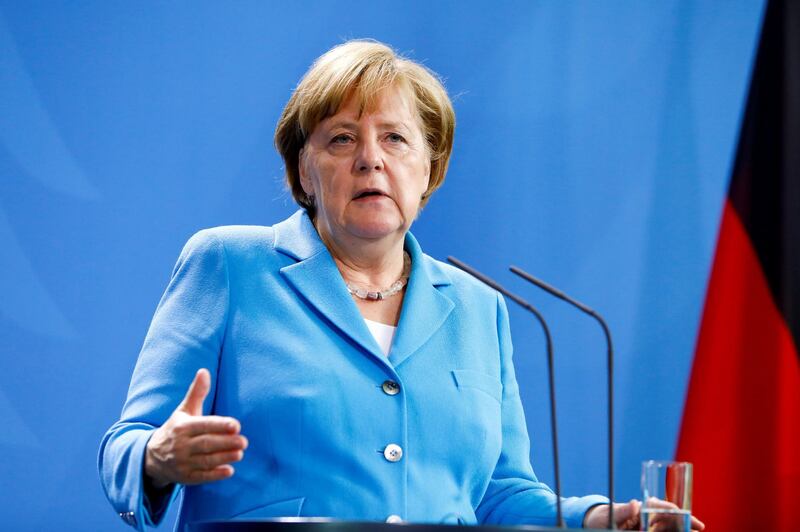Angela Merkel is facing the most serious challenge from within her own centre-right faction since taking over as chancellor in 2005 amid a revolt over proposals to turn away asylum-seekers at the border.
The German chancellor’s Bavarian allies are backing the interior minister’s attempts to bring in a new hostile asylum regime. Horst Seehofer, the minister, has reached to newly empowered right-wingers from Austria and Italy to form an “axis” against liberal migrant laws.
Proceedings in the Bundestag were halted yesterday as Mrs Merkel sought to shore up support within her party, the Christian Democratic Union (CDU), following the revolt from Mr Seehofer’s regional bloc, the Christian Social Union (CSU).
_______________
Read more:
Dispute over Germany's approach to migration draws in Austria's young leader
The fate of Aquarius highlights the triumph of nationalists across Europe
Germany arrests Tunisian over 'toxic substances'
_______________
The long-serving German chancellor wants instead to mastermind a tighter Europe-wide policy on migration and asylum. However after the party meetings the CSU said it was sticking to its demands that Mr Seehofer proceeds with his legislation. "We definitely stick to our point of view," said Alexander Dobrindt, the CSU leader in parliament.
The new approach would almost certainly mean a re-imposition of permanent border checks on the German frontier, something that disappeared under Europe’s freedom of movement laws.
Wolfgang Munchau, an economist and commentator said Mrs Merkel’s room for manoeuvre in the crisis was limited by the change of governments elsewhere. “Immigration crises are by nature cross-border events, but there are further eery parallels between the developments in Germany and Italy right now. In Germany there is now an open revolt against Angela Merkel, who is now desperate to find a European solution within a very short period of time,” he said in a research note.
"Merkel met Horst Seehofer, CSU chief and interior minister, last night and put forward a compromise, according to the German news agency DPA. The idea is for Germany to strike bilateral agreements with Italy and Greece, under the umbrella or at least with the acquiescence of the EU. Such deals would then make it possible for Germany to reject immigrants that have already been registered in those countries at the border. This is the central demand of Seehofer and the CSU: a blanket rejection at the border of any refugee already registered in another EU country.”
However the junior party does not believe Mrs Merkel can deliver her compromise and wants to press ahead with its own proposal. The emergence of divisions within the German government brings the crisis wracking Europe to a new level. In scenes unthinkable just a year ago the Austrian chancellor, who is in coalition with the far-right, shared a stage with Mrs Merkel’s dissident interior minister on Wednesday.
Using language that revived the terminology of the Nazi era, Sebastian Kurz said an axis of the willing should be formed to resist rising numbers of immigrants in Europe. “Austria’s Chancellor Kurz has called this a “Berlin-Vienna-Rome axis,” wrote analyst Constanz Stelzenmuller. “Not the best association to invoke. Still, it‘s clear this is about regime change. The culture wars have reached Berlin.”
In his very first act on taking the Interior minister job earlier this year, Mr Seehofer renamed his role as Heimat (Homeland) minister, another term loaded with Nazi era connotations.
With an autumn election looming in Bavaria, Germany’s largest state, the CSU is keen to quash any threat from the extremist Alternative for Deutschland. “It’s decision time,” Bavarian premier and Seehofer ally, Markus Soeder said. “Sometimes we have to think of our home population, not all of Europe."
In fact both centre-right parties are in a grand coalition with the Social Democratic Party of the centre left. Its leaders said Mr Seehofer’s proposals were unacceptable. Andrea Nahles called for the quarrel to end as soon as possible. "Acts of drama intended to serve the cause of regional elections aren't appropriate," she said.







